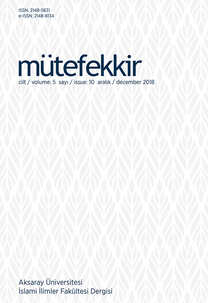Eğitime Siyasi ve İdeolojik Yaklaşımlar Bağlamında Köy Enstitüleri ve İmam Hatip Okulları
Eğitimin uzak hedefi olarak belirlenen devletin eğitim politikasını şekillendirdiği esas nokta, devletin ihtiyacı olan nitelik ve donanımlara sahip olan iyi insan iyi vatandaş yetiştirmektir. Bu hedefler doğrultusunda da eğitim uygulamalarının sosyal ve siyasal değişimlerden etkilenmemesi mümkün görünmemektedir. Ancak bu değişimlerin sürekli olması eğitimde istikrarı zedeler. Türk eğitim tarihine baktığımızda Türkiye’deki siyasi dalgalanmalardan etkilenen; halk evleri, köy enstitüleri, Kur’an kursları, İmam Hatip Liseleri gibi kurumlar dikkat çekmektedir. Bu makaleyle ideolojik- siyasi yaklaşımların etkilediği iki kurum olan köy enstitüleri ve imam hatipler bu yönleriyle ele alınacaktır. Yapılan bu çalışmayla ayrıca, köy enstitülerinin kapatılma sebebinin, siyasi kaygılarla ve rejim aleyhtarlığının göstergesi olarak İmam Hatiplerin açıldığı yönündeki iddialar tartışılarak, siyasetin yön değiştiren rüzgârlarından etkilenen bu iki kurum bu açıdan değerlendirilecektir.
Anahtar Kelimeler:
Köy Enstitüleri, İmam Hatip Okulları, Siyaset, Eğitim, Eğitim Politikası
Village Institues and Imam Hatip Schools in the Context of Political and Ideological Approaches to Education
The main policy of the national education is to train people who have the qualifications that the state needs. Educational practices are influenced by social and political changes. However these changes would damage the permanency of the education when they are consistent. When we look at the history of Turkish education; institutions affected by the political fluctuions such as public houses, village institutes, Quran courses, Imam Hatip High schools draw attention. With this article, village institutes and religious schools which are affected by the ideological-political approaches will be discussed with this aspect. Also the claims about closure of village institutes on account of political anxiety and opening the Imam Hatip High schools, as an indicator of anti-regime, will be discussed. Two institutes affected by the shifting winds of the politics will be evaluated.
Keywords:
Village Institutes, Imam Hatip Schools, Politics, Education, Education Policy,
___
- Ayhan, Halis, Türkiye’de Din Eğitimi, Dem Yay., 3. Baskı, İstanbul, 2014.
- ISSN: 2148-5631
- Yayın Aralığı: Yılda 2 Sayı
- Başlangıç: 2014
- Yayıncı: Aksaray Üniversitesi İslami İlimler Fakültesi
Sayıdaki Diğer Makaleler
Tevfîk Yûsuf El-Avvâd’ın “Er-Rağîf” Adlı Romanında Türk İmajı
Türkiye’deki Farklı Kıraat Anlayışlarıyla İlgili Değerlendirmeler
Türkiye’de Yapılan Barış Konulu Dini Araştırmalar: Bir İçerik Analizi Çalışması
Merv’de İslâmî İlimlerin Doğuşu (Hicrî İlk İki Asır)
Arap Dilinde Lâmu’l-Âkıbe ve Türkçe Kur’ân Meallerine Yansıması
Siyasal İletişim ve Din: Birlikteliğin İmkânı
İbnü’z-Zübeyr es-Sekafî’nin (v. 708/1308) Hayatı ve Surelerin Tertibi Meselesine Yaklaşımı
Süleyman b. Abdülmelik Dönemine İlişkin Bazı Tespitler
Osmanlı Anadolu’sunda Tefsir Derslerinde Öğrenci Soruları Amme Cüzü Tefsîri Örneği
